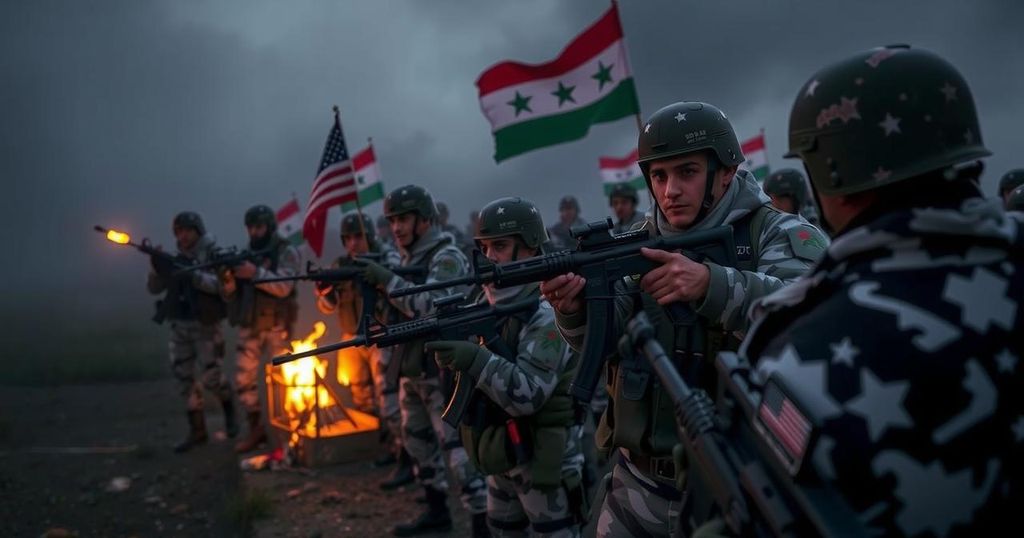Rebels Gain Ground in Syria Amidst Weakening Support for Assad
Recent developments in Syria indicate that rebel forces have seized the opportunity to strike against President Bashar al-Assad’s regime, benefitting from the diminished support of his key allies—Iran, Hezbollah, and Russia. The capture of Aleppo highlights the vulnerabilities within Assad’s coalition as internal and regional factors shift the balance of power in favor of the rebels.
In recent developments within the ongoing Syrian conflict, the rebel forces have capitalized on a significant weakening of President Bashar al-Assad’s allies, notably Iran, Hezbollah, and Russia. Previously, Assad’s regime relied on substantial support from these entities to suppress opposition fighters. However, as these allies find themselves preoccupied or diminished by their internal struggles, the rebel factions have orchestrated a momentous offensive, culminating in the capture of much of Aleppo, one of Syria’s major urban centers. Analysts suggest that the swift military success underscores the vulnerabilities of Assad’s coalition, which had once seemed robust.
The Syrian civil war, which commenced thirteen years ago from peaceful protests, evolved into a multifaceted conflict involving numerous external actors. Initially, Iranian forces and Hezbollah, alongside Russian military involvement, provided crucial support to Assad’s government. However, Iran’s current setbacks, primarily due to Israeli airstrikes and an ongoing economic crisis, have contributed to the diminishing support for Assad. Concurrently, Hezbollah’s losses in its conflict with Israel have further eroded its capacity to assist the Syrian regime effectively.
Russia, once a pivotal pillar of support, is increasingly preoccupied with its protracted involvement in Ukraine, resulting in a noteworthily decreased presence in Syria. Despite conducting some airstrikes against the rebels, the intensity of Russian military support does not match that of previous years. This shift has left Assad vulnerable, as the rebels faced less resistance and were able to execute a well-prepared offensive.
Moreover, the geopolitical dynamics surrounding the conflict have shifted. The recent ceasefire between Hezbollah and Israel, coupled with Turkey’s changing stance towards the opposition forces, has created an environment conducive to a rebel resurgence. The leaders of the rebel factions, particularly Hayat Tahrir al-Sham, have been astutely monitoring these developments and have utilized this opportunity to bolster their military capabilities while mobilizing against the Assad regime.
Compounding Assad’s difficulties, economic disarray has facilitated growing dissatisfaction among the Syrian populace. The lack of tangible progress following territorial recaptures has strained government legitimacy, with many citizens unwilling to confront the advancing rebel forces due to conscription into a faltering military. As regional conflicts persist, the delicate balance of power within Syria has become increasingly precarious for Assad’s government and its supporters.
The intricate backdrop of the Syrian civil war began thirteen years ago when peaceful protests against President Bashar al-Assad’s regime were met with violence, leading to an extended conflict marked by complex alliances and foreign interventions. Initially, the Syrian government experienced significant support from Iran, Hezbollah, and Russia, which provided military, strategic, and humanitarian assistance throughout the war. However, various factors, including Israel’s military actions and Iran’s internal crises, contributed to the current weakening of Assad’s support network, enhancing the position of rebel factions. This backdrop is crucial for understanding the recent shifts in power dynamics within the ongoing conflict.
In summary, the recent offensive by Syrian rebel factions signifies a pivotal shift in the long-standing conflict, as the once-solid foundation of support for President Bashar al-Assad has eroded significantly. The diminishing involvement of key allies—Iran, Hezbollah, and Russia—coupled with prevailing regional conflicts, has emboldened rebel forces to capitalize on this window of opportunity. The evolving geopolitical landscape, especially Turkey’s changing stance, may further influence the trajectory of the conflict and the future of Assad’s regime.
Original Source: www.nytimes.com




Post Comment